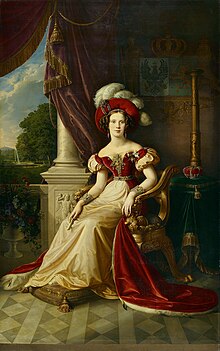| Marianne of the Netherlands | |||||
|---|---|---|---|---|---|
| Princess Albert of Prussia | |||||
 Portrait by Karl Wilhelm Wach, 1832 | |||||
| Born | 9 May 1810 Dutch Palace, Berlin, Kingdom of Prussia | ||||
| Died | 29 May 1883 (aged 73) Reinharthausen Palace, Erbach, Eltville, Grand Duchy of Hesse | ||||
| Spouses |
Johannes van Rossum (partner; 1848; d. 1873) | ||||
| Issue |
| ||||
| |||||
| House | Orange-Nassau | ||||
| Father | William I of the Netherlands | ||||
| Mother | Princess Wilhelmine of Prussia | ||||
Princess Marianne of the Netherlands, Princess of Orange-Nassau (Wilhelmina Frederika Louise Charlotte Marianne; 9 May 1810 – 29 May 1883) was the youngest child of King William I of the Netherlands and Princess Wilhelmine of Prussia.
Princess Marianne was a woman who thought and lived very unconventionally for her time because she had left her unfaithful husband Prince Albert of Prussia and had an illegitimate son (whom she openly recognized) with her partner Johannes van Rossum, with whom she also lived in a common-law marriage. She was banished from the Kingdom of Prussia.
An avid art collector and patron, she made her new residence, Schloss Reinhartshausen in Erbach, a cultural attraction on the Rhine. Through her remarkable social commitment to the needy, especially in the Rheingau and Silesia, she gained great sympathy among the population. The Johanneskirche in Erbach, which was founded by the deeply religious Marianne after the tragic death of her 12-year-old illegitimate son, is closely linked to her fate. This church is an exceptional cultural monument and was the first Protestant church in the Rheingau.